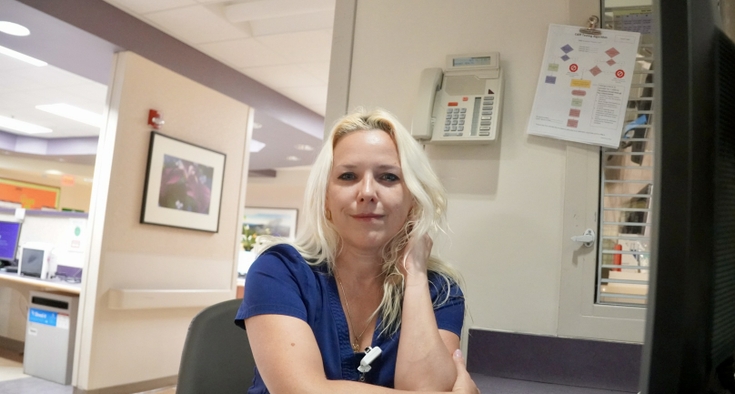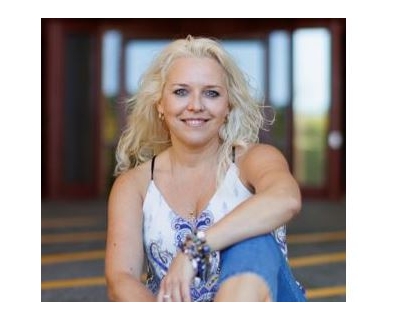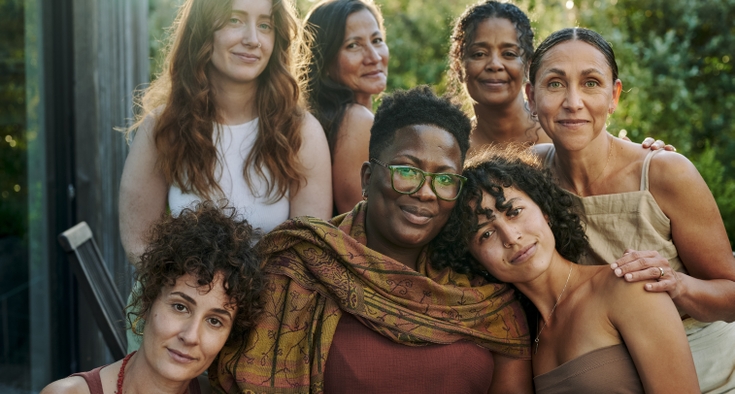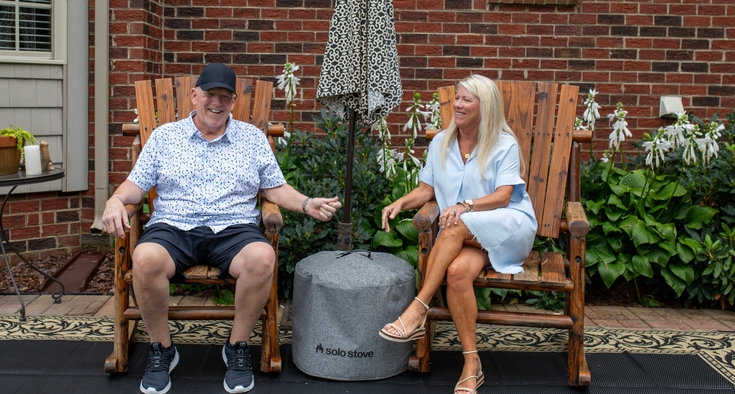Editor’s note: This is one in a series of stories exploring the survivorship journeys of Novant Health Cancer Institute patients. You’ll find all the stories here. We celebrate our survivors and share their stories to showcase how surviving – and thriving – after a cancer diagnosis is possible.
The “C word” wasn’t on Oksana Kovalyova Manning’s radar when she was diagnosed with endometrial cancer in 2017 at 39.
“I didn’t have any symptoms,” she said. “I was always healthy. I exercised. I never smoked. I didn’t drink. I was never overweight. All of that stuff.
“I went to the doctor for something minor and we found it. My doctors said it wasn’t fast growing and we could do conservative things. And we did. I was responding great to hormonal treatment.”
When cancer returned in 2019, it was a different story.
“They were not expecting to find what they found,” she said. “It had spread.”
She had a total hysterectomy. Chemo and radiation followed within two weeks of surgery.
Supportive cancer care throughout your journey
“Life as I knew it as a happy person was over,” Oksana said. “To go from being healthy and going places to, all of a sudden, being sick, stuck laying down puking and battling something that potentially could take your life was hard.
“Chemo is no joke,” she continued. “It kills everything. After some treatments, I had such horrible chills that my teeth cracked. You’re so cold, under six blankets and still freezing. Then there are times you’re so hot that you think your skin is on fire.”
And about fatigue, she said, it’s a test of mental fortitude: “You need a 30-minute nap after a shower.”
“I’d live by steps,” she said. “The first couple of days, I’d do 15 steps to the next building to walk my dog. Then I’d go around the building. Then I’d go up the road. And by week three, you’re totally vulnerable but feeling a little better. I’d be able to go around the Lenoir-Rhyne University campus.”
Oksana is no stranger to facing adversity. Born in Belarus, she immigrated to the U.S. nearly 20 years ago – leaving behind a Ph.D. program in linguistics and starting over in America.
She went to college, got a degree in health care management. She started doing billing work for a pediatric office but knew she could do more.
That spark of passion led to nursing school and, after graduation in 2014, Oksana found her calling in the intensive care unit at Novant Health Forsyth Medical Center, where she continues to work today.
“I love the ICU,” she said. “It’s a different kind of nursing. All you care about is your patient surviving. It takes a special personality to deal with death and dying on a regular basis.”
Oksana’s own cancer diagnosis threw into sharp relief her stance on living, the boundaries she puts in place and how she views her work. “I became more compassionate and less coarse and very, very respectful of these processes – of life and death,” she said. “Everyone should have their own peace of mind when they cross that line or when their loved one is at that line ... and not everyone gets that.”
She admitted she doesn’t talk about her disease process a lot. “Once I started treatment, I decided I am on a healing journey and mission,” she said. “It is not a part of my reality. I don’t use the word cancer. I use ‘the C word.’ Cancer was like a bad relationship. You don’t ruminate on a bad relationship. I found my boundaries with ‘the C word.’ I defined it. I faced it. And I put it in my past.”
Oksana leaned on her adoptive American mother; her teacup poodle, Tini; and her close friends to get her through. Unfortunately, her cancer treatment coincided with her marriage and dreams of a family falling to pieces.
“I was at the lowest of lows,” she said. “There were so many ‘cant’s’ in my life; I started looking around and finding the little ‘cans.’”
She’d drive to a nearby park and walk around the lake on her good days. “I was finding beauty in anything I could in my life,” she said. “The more you focus on the ‘cans,’ the more you find them.”
She found solace in nature, especially at the Outer Banks; in time spent with her dog; in survivors she connected with through social media; in art – writing, photography, drawing and painting mandalas; and doubling down on her education. She returned to school for a doctorate in nursing, which she earned in 2023. She can now use the initials “DNP” (Doctorate in Nursing Practice) behind her name – although she usually introduces herself as simply a nurse practitioner.
“I’m monitored every three months,” she said. “So far, so good. I take things three months at a time now.” She prioritizes exercise, tending to her mental health and taking time for the things she loves.
“I would tell people who are newly diagnosed to take their time to grieve,” Oksana said. “Call it a name. Call it the worst word you can find. Give yourself time to scream, to cry, to grieve. But then … try to make the best out of it. There will be so many people who will tell you what you can’t do, whether you’re diagnosed at 20, 40 or 50. There are many more things you’ll discover you can do. You have to have faith and start looking.”








